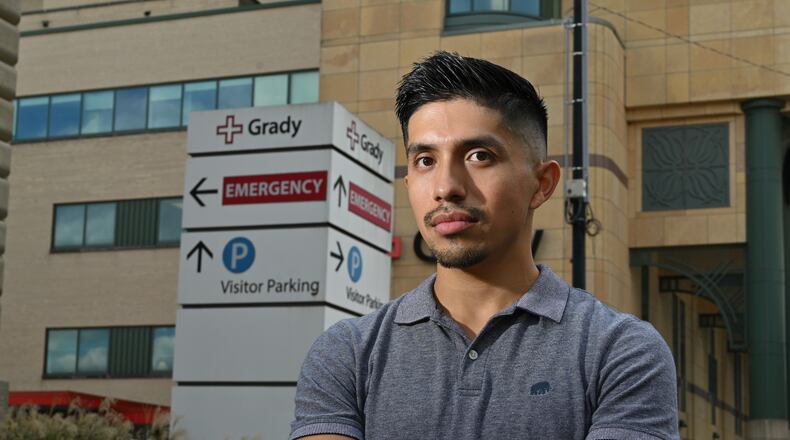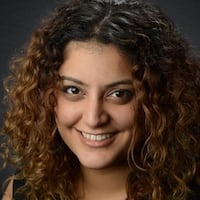Occasionally Humberto Orozco will look down at this phone, and see the name Hakeem White pop up on the screen.
As president of Latino LinQ, an advocacy group that supports Atlanta’s Hispanic LGBTQ community and their families, in the areas of health care and legal assistance, Orozco always takes the call from his cohort at the HIV advocacy group Someone Cares of Atlanta. The pair will talk about ways to reach members of the Hispanic community living with HIV, and ways to be more inclusive in their services.
“We need to do more educational campaigns around HIV and debunk the myths that are very much still spreading in the Latinx community,” Orozco said. “It’s still a pervasive myth in the Latinx community, that (HIV) is a death sentence. People don’t realize there are treatments for HIV and you can live a relatively normal life.”
Before the pandemic, HIV advocates and researchers in metro Atlanta were busy taking on the task of eradicating HIV, while also providing services for people living with the virus. But during the COVID-19 pandemic their task has been complicated by lockdowns that temporarily closed testing sites, delayed medical research trials and made outreach services difficult.
Credit: Submitted by: Humberto Orozco
Credit: Submitted by: Humberto Orozco
“The impact of the pandemic has been bigger than most people realize,” said Dr. Carlos del Rio, executive associate dean of Emory University School of Medicine. “The impact of the pandemic also goes into the ability to conduct HIV studies. The reality is, as a result of the pandemic, these things have derailed.”
Similar to COVID-19, the HIV/AIDS epidemic has disproportionately impacted non-white communities.
In May, the Centers for Disease Control and Prevention released updated national HIV surveillance data which found Hispanic/Latino people accounted for 29% of HIV infections in 2019, while making up about 18.5 % of the overall population, according to the latest Census figures.
That same year, the CDC reported that just about 23% of people eligible for pre-exposure prophylaxis (PrEP), taken to reduce the risk of getting HIV if exposed to it, were prescribed it. However, there are sharp inequalities in the access racial groups have to the treatment. In 2019, about 14% of Hispanic/Latino people who were eligible for PrEP were prescribed it, compared to 63% of white patients.
In Georgia, the latest Census data shows Hispanics make up about 10%of the state’s population, and accounted for 9% of HIV cases in 2019, according to the Georgia Department of Public Health. Overall, about 70% of persons living with HIV in Georgia resided in the metro Atlanta area that year.
“I think oftentimes, and we can see this with COVID, folks say ‘oh these are hard-to-reach communities.’ No, they’re hardly reached communities,” said Daniel Driffin, the co-founder of HIV support network, Thrive SS.
Driffin said Atlanta’s Hispanic community faces a “perfect storm” of barriers when it comes to getting proper access to prevention and treatment. These roadblocks include immigration concerns, language barriers, and lack of access to health care and transportation.
All of that makes outreach even more important, Driffin said. “It takes time to rebuild those trusted relationships.”
One way of building trust is to remove the fear of seeking medical services. With guidance from Orozco, Someone Cares stopped asking for government ID cards, and began expanding access to information in Spanish.
Credit: HYOSUB SHIN / AJC
Credit: HYOSUB SHIN / AJC
“Although historically we’ve provided services to transgender African American men who have sex with men, we want to extend our services to additional marginalized communities because that’s the only way to can end this HIV epidemic,” White said.
To help expand access to HIV testing, the Mexican Consulate in Atlanta has partnered with Latino LinQ to provide free testing and educational resources in both English and Spanish.
“Our community needs information and the tools of prevention for progress. So the key here is prevention,” said Dianne Roman, coordinator for Ventanilla de Salud Atlanta, a health branch of the Mexican Consulate’s office.
Roman said it’s common for people to get a bit anxious about their HIV test results, and in some cases those fears will prevent them from going through with the test.
In addition to his work with Latino LinQ, Orozco also works with Emory University School of Medicine as a community educator. Within that role he spreads awareness about vaccinations and medical trials that are taking place. He most recently worked on enrolling patients into a clinical trial for a potential HIV vaccine.
Del Rio said he encourages members of the Hispanic community to enroll in future studies because diversity matters when it comes to medical research.
“Without community nothing happens, " he said.
About the Author
Keep Reading
The Latest
Featured




